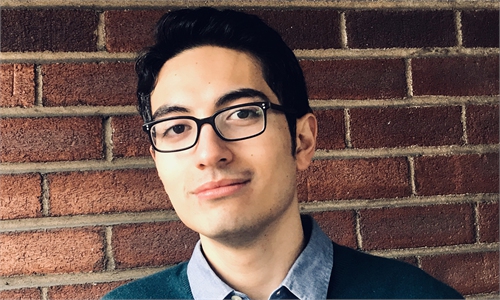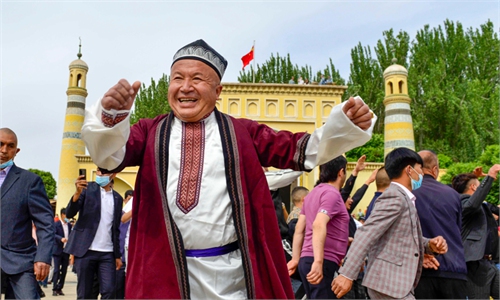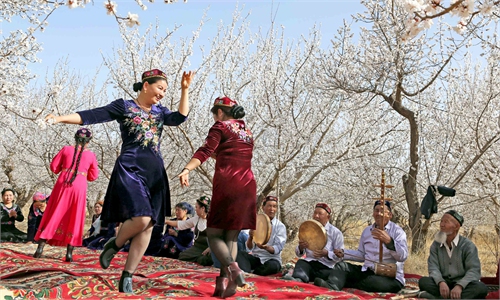IN-DEPTH / IN-DEPTH
Chinese scholars share country’s remarkable human rights progress internationally with great confidence
Contribution with Chinese wisdom
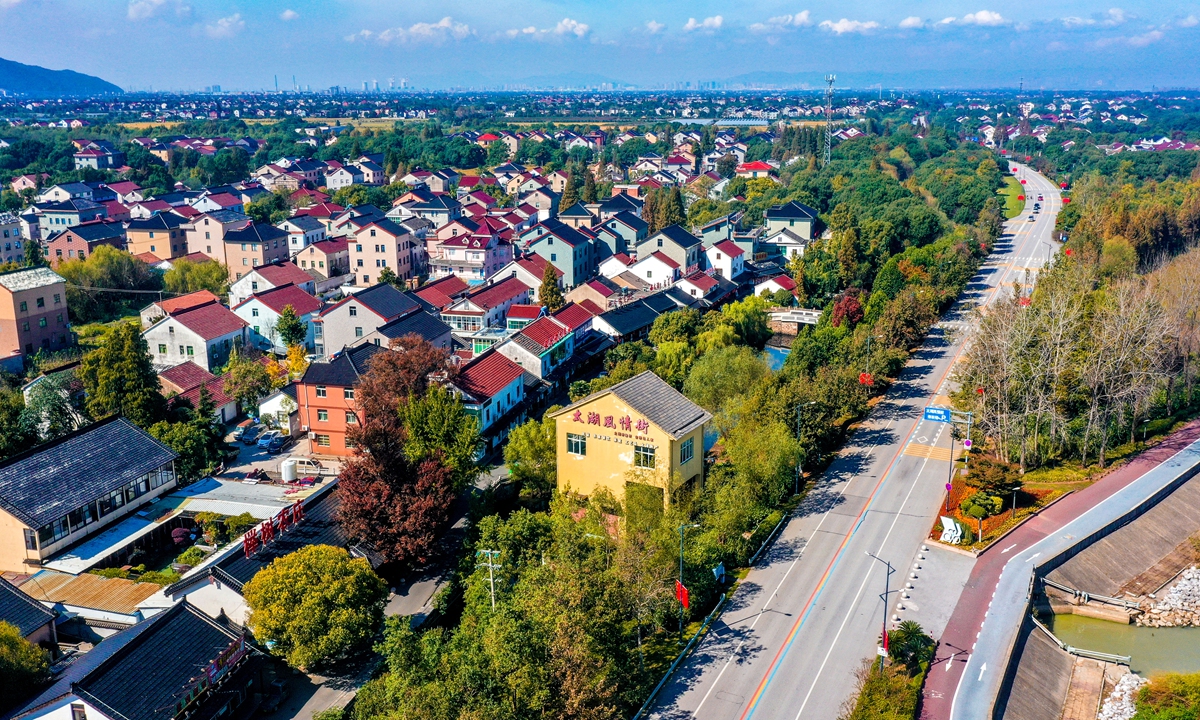
A village in Huzhou, East China's Zhejiang Province. Photo: VCG
Editor's Note:What is the real human rights situation in China? This is a question that has been so frequently asked to Chinese scholars in international circles. Amid so much disinformation and untenable human rights violations allegations against China, Chinese scholars have offered data and facts detailing China's achievements in improving human rights - lifting 99 million rural poor people from poverty, providing 38 million students with a nutrition allowance every year, supporting treatment for more than 20 million poor patients, and protecting people's lives amid the COVID-19 pandemic.
All of China's human rights achievements are hard won with years of efforts. The practices constitute the foundation of China's ideas on human rights, and stories of how China has walked its own path on human rights have been shared by scholars.
The Global Times reporters interviewed three Chinese scholars who have attended international seminars and meetings many times, and listened to their stories of how China started its own practices and ideas on human rights, how its stories on human rights have been told to the international community, what problems scholars have encountered, and what have made them more confident in sharing Chinese wisdom and offering Chinese approach to the international governance in the human rights field.
Starting with living rights
How did China start its practices and studies in human rights? Zhang Yonghe, professor and executive dean of the Human Rights Institution at Southwest University of Political Science and Law in Chongqing, recalled that China's ideas on human rights have evolved with the times and the studies on human rights in China had also experienced significant changes.
On November 1, 1991, the Chinese government released its first white paper on human rights, which is also the first official document to introduce its stance on human rights and the human rights Chinese people enjoyed.
"The white paper put forward a very important concept - human rights should be firstly about the right to a standard of living - it is not only about feeding the masses but about the living conditions of the people. This white paper marked the start of China's ideas on human rights," said Zhang.
Zhang has worked in the human rights field for the past three decades and he told the Global Times that the studies on human rights in China started in the mid-1980s with scholars seeking theoretical support from Marxism and drawing inspiration from the West, and China built the theories undergirding China's human rights ideas.
The white paper in 1991 became a cornerstone in laying the foundation for China's human rights development, and the government's practices in protecting human rights along with the reform and opening-up had enriched China's human rights theories.
In 2004, China enshrined the respecting and protecting of human rights into its Constitution and its practices and ideas on human rights kept evolving. In 2007, respecting and protecting human rights was also officially incorporated into the Constitution of the Communist Party of China (CPC).
With the development of theories and practices of human rights, the topic of human rights attracted great attention in China.
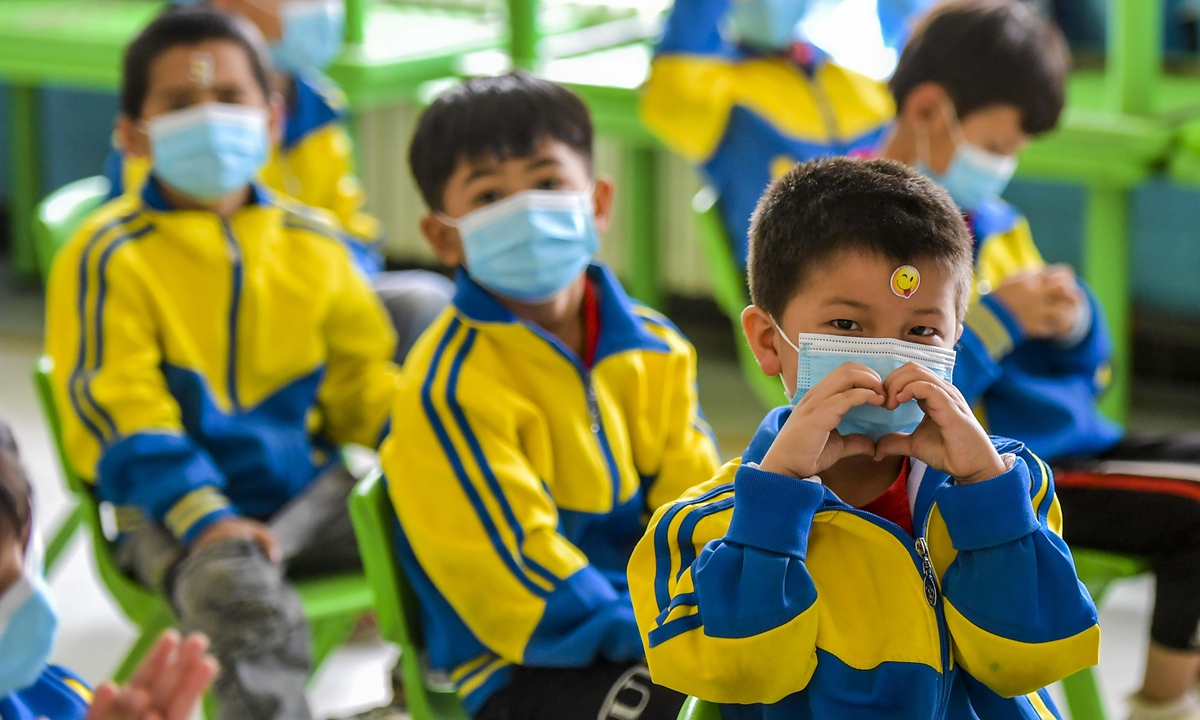
Children play games at a kindergarten in a relocation project district, a beneficiary of poverty alleviation efforts in Qira county, Xinjiang Uygur Autonomous Region, on September 19, 2020. Photo: VCG
"'Human rights' is a phrase with more dynamic meanings, and with the establishment of China's ideas on human rights, more people have realized that many proposals China has put forward - for example, the ideas of people first and 'lucid waters and lush mountains are invaluable assets' - are all about human rights," said Zhang.Especially after the 18th CPC National Congress in 2012, China's human rights work had made great progress and the studies on human rights had blossomed.
Along with people's increasing familiarity with the phrase "human rights," China's confidence in expressing its views on human rights also increased. Mao Junxiang, executive director and professor at the Human Rights Studies Center at the Central South University, said many factors had contributed to such improvement.
Respecting and protecting human rights became the main governance compass of the CPC and appeared in the leaders' public remarks and various papers, making these topics mainstream narratives. The country's great achievements in human rights protection made more people share China's ideals; the studies and publicity campaigns conducted by universities helped create a good social atmosphere, and all governmental levels attached greater importance to protecting human rights, especially during the fight against COVID-19, Mao said.
"In the past decade, many great achievements have been made in China's human rights work, laying foundations for theories and practices. China's development in human rights in this decade is entirely different from that in the previous decade," said Mao.
Putting priority to people's happiness
In 1995, a new white paper was put forward to ensure that people's rights to a standard of living and development were the top priority, and in 2019, another white paper said that people living a happy life was the biggest of all human rights. For the past 30 years, China's ideas on human rights have been improved along with the implementation of rights protection practices.
Data on human rights clearly outlined China's achievements over the previous decades, especially after 2012. In August, 2021, the State Council released a white paper to illustrate how China had achieved moderate prosperity and advanced human rights.
One such milestone achievement is in poverty alleviation work. Since the launch of the reform and opening-up policy in 1978, 770 million rural Chinese people living below China's poverty line have been raised from poverty. China realized the poverty reduction goal from the UN's 2030 Agenda for Sustainable Development 10 years ahead of schedule, representing a significant contribution to global poverty reduction and human progress.
Northwest China's Xinjiang region was one of the main battlegrounds in poverty alleviation. Xinjiang has adopted poverty alleviation measures to help the poor, such as developing commerce, creating job opportunities, and improving education and health care.
According to data from a white paper released by the State Council Information Office in July 2021, by the end of 2020, more than 2.7 million rural people in Xinjiang living below the poverty line had been elevated from poverty, and 3,666 villages and 32 counties were no longer classified as impoverished.
Despite such achievements in human rights in the Xinjiang region, the West and especially the US have ramped up efforts to smear China's policies in the region in recent years.
To debunk disinformation about Xinjiang, Zuliyati Simayi, vice-president of Xinjiang University, attended the UN Human Rights Council and other sideline activities to deliver speeches and share her views on Xinjiang's development.
"I am a woman who was born and living in Xinjiang. My story is about how a woman of ethnic minority grow up to become a scholar," she said, recalling that many of the audiences raised hands to talk to her and a fellow attendee asked for her contact details hoping to know more about the progress in the rights protection for women and children in the region.
Zuliyati told the Global Times that women in the Xinjiang region used to be disempowered in society without economic independence or political representation. The situation began to change after 1949 as the government promoted gender equality and nowadays, women have become an equal pillar of the society.
The social stability in the region has also helped more women to enjoy rights to other developments. Zuliyati told the story of Renagul Supy, founder of an embroidery workshop in Hami of Xinjiang.
With the help of the local government, Renagul and her mother started the workshop and embroidered high-end garments, which have also graced runways at Paris Fashion Week. Renagul not only peaked in her career but also encouraged more women around her to join the workshop.
Mission on de-stigmatization
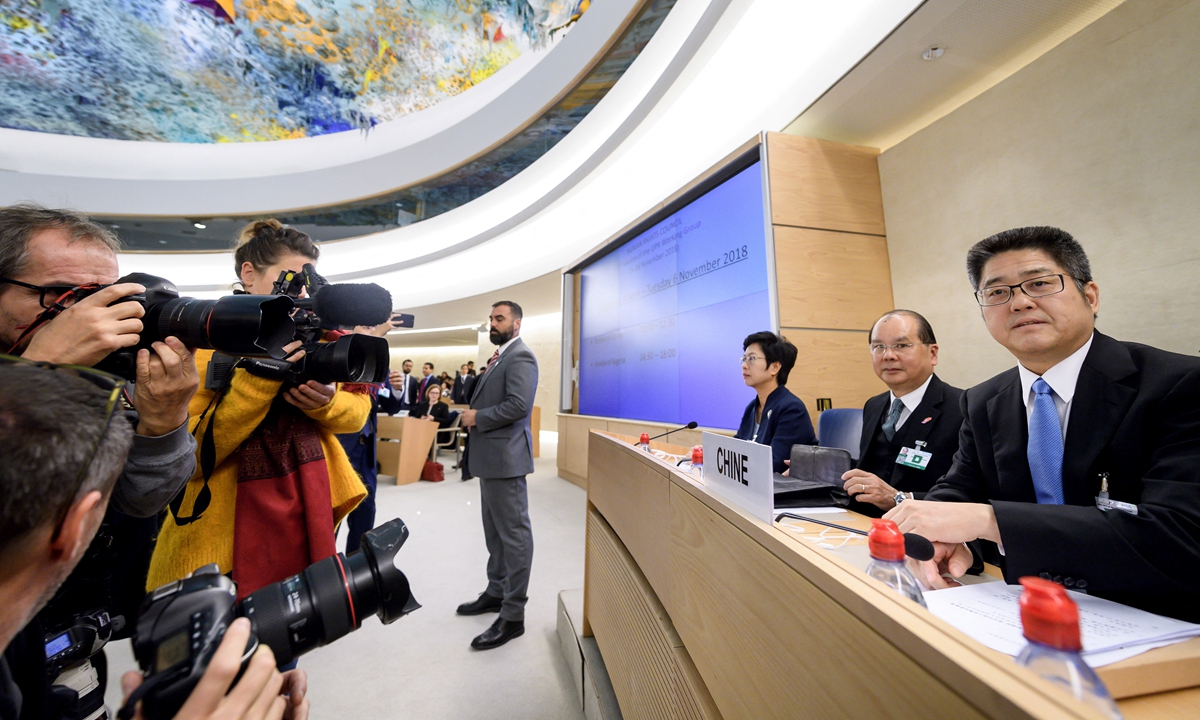
Chinese Vice Minister of Foreign Affairs Le Yucheng (right) arrives at the United Nations Human Rights Council prior to the start of the Universal Periodic Review of China on November 6, 2018 in Geneva. Photo: AFP
Like Zuliyati, Zhang and Mao also attended the UN Human Rights Council and other sideline activities to share China's practice on human rights.The Human Rights Studies Center at Central South University, where Mao works, also holds seminars on various topics, including poverty alleviation and racism with many foreign scholars in attendance.
Chinese scholars are becoming more confident and have frequent exchanges with their foreign counterparts. "The feeling of being a novice is now gone and we boldly share with them our own views and experiences. Moreover, we also take the initiative to set topics," Mao said, noting that foreign scholars who have objective views on China's human rights situation accept China's ideas and practices better.
Mao shared the story of one of his colleagues who came from Germany. Peter Herrmann has worked at the center since the end of 2019 and in February 2020, with the help of the center, went back to Germany and told people how the city of Changsha and China in general fought against the epidemic, which was not as chaotic as some Western media outlets had described.
When the epidemic was brought under control in April and May 2020 in China, it was Europe that then fell on dire straits to the epidemic in the region. Herrmann began to think that such a comparison could be attributed to China's deeply rooted collectivism and better balance between individual freedoms and the greater interests of the society.
Herrmann shared his experience and insight about China with many scholars in international seminars and invited them to view China's human rights situation with the context of the times.
"In battling against the coronavirus disease and protecting human rights, we have done a better job than the West," Mao told the Global Times.
Previously, the West dominated the narrative around human rights, ignoring and denying other countries' experiences. But the failure of transplanting the Western model to other countries has created a stark contrast with China's progress, making China's ideas on promoting human rights more persuasive, said Mao.
The expert noted that in contrast with the West's eagerness to promote its system and values, China uses "development" as the key to solve real problems
"China has put forward a community with a shared future through the Belt and Road Initiative and the ideas of promoting and protecting human rights in the process of development… all these efforts highlight the fact that a country that wants to engage in human rights work in a meaningful way needs to walk its own path to improve its people's standard of living and development," said Zhang, noting that without development, all talks on human rights would be empty.
China's human rights progress has contributed to the global human rights legacy and its path on human rights also influenced the world. "We did not follow the Western countries, but walking our own path," Zhang said.
Moreover, developing countries now hold different views on China as we had accomplished poverty alleviation in such a short time and realized long-term and stable social and economic development. Many countries called for China to share its experience and offer assistance in the field of human rights protection.
"We need to thank this era - it has offered us a larger platform and laid the foundation for our confidence - China has been the second largest economy in the world since 2010, while its human rights work has made great strides. China has been widely and deeply engaged in international governance in the human rights field," Mao said.
People of different generations have their own missions. Mao said younger scholars in the human rights field in China have carried on the legacy of the past generation and are more eager and confident to share with the outside world China's experience from the human rights journey.
"We are so eager to tell more people and let them know a true China. We are also so eager to correct the demonization surrounding China's human rights - we see these as our missions," said Mao.
Mao said that China's ideas on human rights are becoming more acknowledged by the international community, and despite the West's dominance in controlling the human rights narrative, China is increasingly winning applause with its successful practices.

